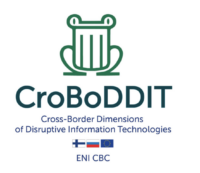The CroBoDDIT project built new cooperation models for companies, cities and future experts with new innovations. The objective was to find digital solutions to the challenges of waste management.
Objective
The purpose of the ‘Cross-Border Dimensions of Disruptive Information Technologies’ (CroBoDDIT) project was to promote the development of significant and disruptive ICT technologies in urban infrastructures, utilising the expertise of local companies.
The challenges of circular economy were tackled through digitalisation especially in urban environments and the waste management ecosystem. Key technologies include IoT, Big Data and blockchain technologies that are applied to overcome the challenges.
The project was carried out in Helsinki, Saint Petersburg and Lappeenranta in accordance with the partners’ individual tasks.
Key measures included:
– carrying out surveys to study awareness of new technologies amongst the citizens , authorities and companies of Helsinki
– seeking ideas, challenges and experiences related to the recycling and processing of solid waste in urban environments
– organising seminars and webinars to increase knowledge and dialogue with expers and stakeholders as well as presenting case examples
– organising hackathons for companies and students based on the ideas and challenges discovered in the hackathons
– presenting the results to city organisations and companies in Finland and Russia
– promoting the establishment of study modules, student exchange and internships related to the theme of the project at LUT and ITMO universities
– creating a demo centre for sharing skills and expertise and publishing the challenges, results, portfolios of experts and information about corporate partners, incubators and financing channels.
Benefits for different target groups
The cross-border feature of the project focused exchanging expertise and best practices between cities.
The project aimed at better serving the citizens by creating a network of the expertise of companies in the participating regions and development work of the cities. The activities were based on virtual and physical demo centre units in Helsinki and Saint Petersburg.
Information exchange through education has also been made possible by integrating educational sections to the curricula of LUT University and ITMO University in Saint Petersburg. In addition to these, hackathon events related to the project were organised alongside studies.
For the participating companies, the project and its activities offered excellent opportunities to showcase their digital expertise and products related to circular economy and waste management in particular, develop consumer and public sector solutions and establish themselves in the local markets of the cooperating areas.
Duration, partners and funding
The partners were Forum Virium Helsinki, Lappeenranta-Lahti University of Technology (LUT) and ITMO University and the Saint Petersburg Information and Analytical Centre. The coordinator of the project was LUT.
The project was financed by the EU’s South-East Finland-Russia CBC programme and the cities of Saint Petersburg and Helsinki. The total budget of the project was EUR 790,301.
In addition to local activities, the project saw cross-border cooperation between Russia and Finland. The project was in line with Russia’s long-term socio-economic development programme.
The project ended in March 2022.
The role of Forum Virium Helsinki
In the project, Forum Virium actively built a base of expertise and skills to take full advantage of open data and new technologies according to the City of Helsinki digitalisation programme.
A key aspect of the project was the digitalisation of circular economy and its urban manifestations and opportunities.
Forum Virium organised workshops, seminars and webinars that were designed particularly for companies and city officials. In addition to these, surveys were carried out to study general awareness of the technologies and any areas of development and related ideas concerning waste management, in particular.
Project benefits for Helsinki
The project strengthened the objectives of service development set in the city strategy and the digital strategy. Helsinki wants to be the most progressive public sector ecosystem in the world and develop coordinated, effective and human-centred services together with the city’s residents and companies.
In practice, through information exchange and expertise sharing, the City has an excellent opportunity to attract potential new experts and companies, receive the best information about applying new technologies and share its own smart city expertise and participatory development skills with other regions.
The project strongly supported the Carbon-Neutral Helsinki 2030 measures and promoted positive cross-border climate and environmental development in line with the targets set by the EU.




